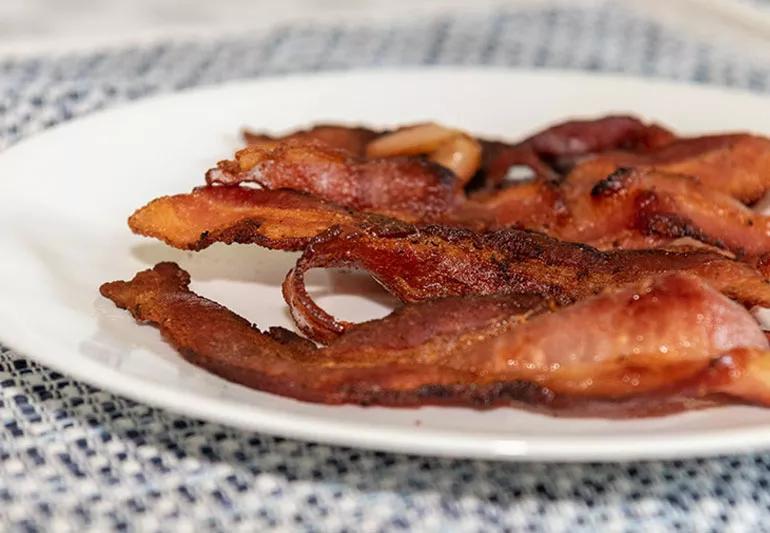Some bad news about the beloved breakfast staple

Image content: This image is available to view online.
View image online (https://assets.clevelandclinic.org/transform/e88a625f-b8e2-4a04-b349-57dc99cde988/baconCholesterol-MC-70720-770x533-1_jpg)
plate of bacon
Bacon is perhaps the best-loved and most-versatile of breakfast meats. No longer just a morning staple, it’s become trendy as an ingredient in appetizers, desserts and even cocktails. But however you consume your bacon, it comes with a downside.
Advertisement
Cleveland Clinic is a non-profit academic medical center. Advertising on our site helps support our mission. We do not endorse non-Cleveland Clinic products or services. Policy
Cardiologist Dennis Bruemmer, MD, PhD, explains why your favorite crispy treat can pose some issues if you’re not careful.
“Any animal product is probably going to be high in cholesterol content,” Dr. Bruemmer says. “That goes from beef to pork to bacon.”
And part of the problem is the portion size when we eat breakfast. While a single slice of bacon may not seem overwhelming in terms of the amount of pure cholesterol, few of us limit ourselves to just one slice.
“Typically, it’s five or six slices of bacon,” Dr. Bruemmer says, “and then you add in a few eggs which also have a lot of pure cholesterol and that adds up.” The amount gets even taller if you pile on carbohydrates like biscuits.
“Bacon tastes fantastic but it’s high in salt and it’ll drive up your blood pressure,” he adds. “It’s high in fat and will elevate your cholesterol if it’s consumed frequently. And both of those lead to heart problems.”
Knowing how much cholesterol you’re taking in when eating bacon is sometimes a bit tricky due to variables like how much fat is on each slice and how thick each slice is, notes dietician Julie Zumpano.
But using the USDA nutrition database as a guide, it counts a serving of 2 slices as about 15 grams of bacon which averages around 90 calories, 10-15 mg of cholesterol and about 7 grams of fat.
Advertisement
Again, those numbers might be a bit higher or lower depending on your cut of meat but these amounts are a decent indicator.
Turkey bacon might seem like a healthier alternative and one that’s gotten a bit more popular in recent years. But it’s a matter of degrees as Dr. Bruemmer points out.
“Turkey is white meat and has less cholesterol, probably about 20% less cholesterol than regular pork bacon,” he says. “But if it’s 20% less, it’s still 80% more cholesterol than if you weren’t to consume it.”
“If patients have coronary artery disease and are concerned about their caloric intake and their diet, I think switching from pork bacon to turkey bacon is cheating on yourself,” Dr. Bruemmer adds. “You’re still consuming high salt amounts and fat that isn’t needed.”
He says he encourages a change to a Mediterranean Diet, instead, that’s more fruit- and vegetable-based and lighter on the high salt, high fat animal products.
Advertisement

Sign up for our Health Essentials emails for expert guidance on nutrition, fitness, sleep, skin care and more.
Learn more about our editorial process.
Advertisement
Pick bell peppers to help fight cancer, memory decline and joint pain
The tropical fruit is a good source of antioxidants and vitamin C
High amounts of cholesterol and saturated fat in red meat may be linked to heart disease
The leaves and pods from this tree are rich in essential nutrients
This starchy root vegetable is a staple in many global cuisines — but it has to be prepared correctly, or it can cause serious concerns
These delicate green sprouts can give you an extra dose of vitamin K and other nutrients — but they’re not safe for everyone
Edamame, lentils and chicken breast are good sources of protein
Eating this root vegetable can help support your eye, heart and brain health
Although it could be used as a moisturizer, this new trend is not recommended
Communicating clear limits helps protect your time, energy and emotional well-being
High cholesterol can be genetic, but testing and treatment can lower your heart disease risk